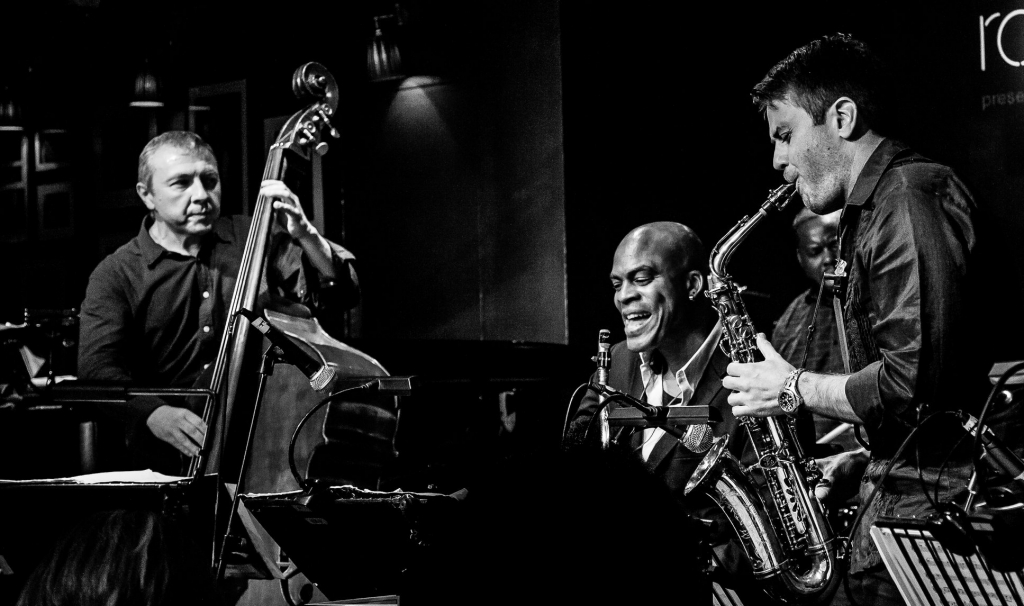Gangue de Guimarães
Coproductions
Residências Artisticas
Creative Grants
Documentação
Networks And Partnerships

BACK
In the third millennium, and after more than a hundred years of history, jazz faces serious identity issues. However, instead of showing signs of exhaustion, jazz seems to have understood that the solution to its problems demands looking at itself from the outside in. In the context of Guimarães Jazz to look from the outside in of this genre means to explore alternative geographies to the native territory of jazz, to promote the work of young musicians who were born in a time when jazz was already fully integrated in modern culture as one of the most expressive artistic languages of the twentieth century, to assimilate musicians who have gained recognition in musical territories closer to the experimental and avant-garde trends of contemporary music and, lastly, to reveal less-known musicians who work in more informal and flexible musical contexts. The matrix of the 2018 edition of Guimarães Jazz is, therefore, supported on a desire to explore zones of counter-information, assuming a critical perspective towards the present of music and of the world and affirming the urgency of a serious reflection about the entropic and autophagic processes, based on immediate stimulus and delusional feelings of belonging, that characterize the creation and the fruition of music in the twenty-first century.
This year’s programme of the festival is composed of thirteen concerts in ten consecutive days, for the first time in the history of Guimarães Jazz. This aspect will allow the festival to have a more effective and constant presence in the city, therefore contributing to a closer relationship between the musicians and the audience. Despite this slight change, Guimarães Jazz continues to be, such as it is since the beginning, a festival concerned with a principle of balance in various dimensions: in terms of the recognition and the age of the musicians involved, of the typology of the formations, of the geographical provenance of the projects and also of the stylistic trends of jazz represented.
Regarding the high-profile concerts, we may highlight three fundamental musicians of the last decades of jazz – the bassist Dave Holland, the trumpeter Dave Douglas and the composer and arranger Steven Bernstein –, musicians who, despite the artistic differences, have given a decisive contribution to transform the shape of contemporary jazz. Holand’s project Aziza, Dave Douglas’ band Uplift and the Millennial Territory Orchestra led by Bernstein are the confirmation of the present artistic vitality of these three great jazz musicians. All three projects involve the collaboration of influential musicians of contemporary music, such as the bassist and producer Bill Laswell and the singer Catherine Russell, two artists who, having developed their work in almost opposite musical languages, may be considered examples of a rare artistic integrity and anti-starsystem attitude.
In 2018, one of the most distinguished features of Guimarães Jazz is the focus on the new generation of jazzmen. The programme includes two emergent musicians of Chicago (one of jazz’s mythological cities which is constantly renovating itself and continues to be as active as it ever was): the trumpeter Marquis Hill and the bassist and composer Matt Ulery, who will perform with his own project, Delicate Charms, and will also direct the workshops and jam sessions and will work with the ESMAE’s big band and string ensemble. The global dynamics of jazz is also present at the festival with the names of Avishai Cohen, an extraordinary Israeli trumpeter who has recorded for the record label ECM, and of the flutist and composer Léa Freire, who will present the project Cartas Brasileiras (Brazilian Letters), accompanied by the Orchestra of Guimarães.
The focus on alternative geographies is also manifested on the concerts taking place in the small auditorium, where the Pablo Held Trio (representative of the excellence of Germany’s jazz scene) and the idiosyncratic band Random/Control, led by the talented Austrian pianist David Helbock, will perform. The Portuguese accordionist João Barradas, a gifted musician who is currently on an ascending trajectory of international recognition, will perform in quartet accompanied by emergent European musicians and by the North-American saxophonist Greg Osby.
The collaboration between Guimarães Jazz with the association Porta-Jazz and with ESMAE confirm the importance of promoting the work of young Portuguese musicians. The workshops and the jam sessions are customary extensions of the festival and of the most important dimensions of its relation with the city of Guimarães and with the Portuguese jazz circuit, while at the same time contributing to potentiate the musical growth and formation of young musicians.
The festival will close with the Mingus Big Band, a tribute to Charles Mingus that will certainly constitute one of the highlights of this year’s edition of the festival. Led by Mingus’ widow, this big band is formed by powerful and gifted musicians and is considered one of the most artistically relevant projects dedicated to the jazz masters’ music. In a time when the future of music, and of the world, is diffuse and difficult to anticipate, it seems to make sense the revisiting of the work of Charles Mingus, one of the most influential names of the music of the twentieth century and an inspirational example of integrity and artistic audacity, values that are now, more than ever, important to celebrate.
Ivo Martins
PROGRAMME
Loading...









